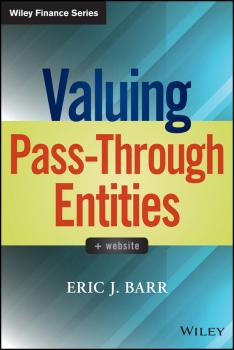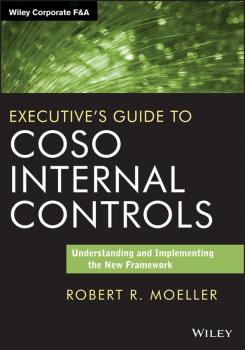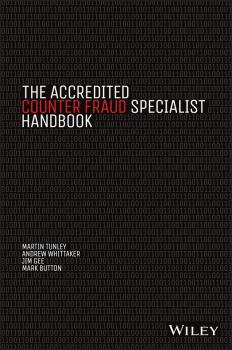Бухучет, налогообложение, аудит
Различные книги в жанре Бухучет, налогообложение, аудитValuing Pass-Through Entities
The clarity and guidance valuation analysts have been thirsting for The business appraisal community regularly names the valuation of pass-through entities as a major issue of concern. Courts, appraisers, and the IRS have long been at odds on the topic, and the contention within the appraisal community itself over methods and inputs further complicates the issue. Valuing Pass-Through Entities provides clarity for the analyst tasked with valuation, offering clear explanations of the different perspectives and approaches to the process. Valuing Pass-Through Entities cuts through the chatter to: Explain the advantages and limitations of different types of pass-through entities Analyze the different viewpoints currently dividing the appraisal community Gain a fresh perspective on landmark cases Explain how to properly utilize a court-tested model Examine detailed sensitivity analyses of different inputs under the income and market approaches The book includes illustrative examples, templates, and a useful technical supplement, plus case studies that demonstrate the real-world effects of various pass-through entity valuation methods and inputs. Detailed analyses and an easy-to-apply model simplify the process while positively affecting outcomes. The companion website provides the text of landmark court decisions, a blog featuring industry trends and tidbits, additional articles, and the insight of the author and other industry leaders. Valuation requires the successful juggling of multiple variables, many of which can have a major impact on value. Analysts need to know how to balance each factor and apply the appropriate rates and discounts, but a lack of standard practice often leaves the issue too subjective. Valuing Pass-Through Entities clears the air, providing real-world guidelines and tools.
Executive's Guide to COSO Internal Controls. Understanding and Implementing the New Framework
Essential guidance on the revised COSO internal controls framework Need the latest on the new, revised COSO internal controls framework? Executive's Guide to COSO Internal Controls provides a step-by-step plan for installing and implementing effective internal controls with an emphasis on building improved IT as well as other internal controls and integrating better risk management processes. The COSO internal controls framework forms the basis for establishing Sarbanes-Oxley compliance and internal controls specialist Robert Moeller looks at topics including the importance of effective systems on internal controls in today's enterprises, the new COSO framework for effective enterprise internal controls, and what has changed since the 1990s internal controls framework. Written by Robert Moeller, an authority in internal controls and IT governance Practical, no-nonsense coverage of all three dimensions of the new COSO framework Helps you change systems and processes when implementing the new COSO internal controls framework Includes information on how ISO internal control and risk management standards as well as COBIT can be used with COSO internal controls Other titles by Robert Moeller: IT Audit, Control, and Security, Executives Guide to IT Governance Under the Sarbanes-Oxley Act, every corporation has to assert that their internal controls are adequate and public accounting firms certifying those internal controls are attesting to the adequacy of those same internal controls, based on the COSO internal controls framework. Executive's Guide to COSO Internal Controls thoroughly considers improved risk management processes as part of the new COSO framework; the importance of IT systems and processes; and risk management techniques.
Corporate Finance For Dummies - UK
The maths, the formulas, and the problems associated with corporate finance can be daunting to the uninitiated, but help is at hand. Corporate Finance For Dummies, UK Edition covers all the basics of corporate finance, including: accounting statements; cash flow; raising and managing capital; choosing investments; managing risk; determining dividends; mergers and acquisitions; and valuation. It also serves as an excellent resource to supplement corporate finance coursework and as a primer for exams. Inside you’ll discover: The tools and expert advice you need to understand corporate finance principles and strategies Introductions to the practices of determining an operating budget, calculating future cash flow, and scenario analysis – in plain English Information on the risks and rewards associated with corporate finance and lending Easy–to–understand explanations and examples Help to pass your corporate finance exam!
Principles of Group Accounting under IFRS
A professional perspective to implementing IFRS 10, 11, and 12 The new International Financial Reporting Standards (IFRS) 10, 11, and 12 are changing group accounting for many businesses. As business becomes increasingly global, more and more firms will need to transition using the codes and techniques described in Principles of Group Accounting under IFRS. This book is a practical guide and reference to the standards related to consolidated financial statements, joint arrangements, and disclosure of interests. Fully illustrated with a step-by-step case study, Principles of Group Accounting under IFRS is equally valuable as an introductory text and as a reference for addressing specific issues that may arise in the process of consolidating group accounts. The new international standards will bring about significant changes in group reporting, and it is essential for accountants, auditors, and business leaders to understand their implications. Author Andreas Krimpmann is an internationally recognized authority on the transition from GAAP to IFRS, and this new text comes packaged with GAAP/IFRS comparison resources that will help make the changes clear. Other bonus resources include an Excel-based consolidation tool, checklists, and a companion website with the latest information. Learn about: Definitions, requirements, processes, and transition techniques for IFRS 10, 11, and 12 covering group level accounting Practical implementation strategies demonstrated through a clear case study of a midsize group Key concepts related to consolidated financial statements, joint ventures, management consolidation, and disclosure of interests Comparisons between GAAP and IFRS to clarify the required changes for international firms Whatever stage of the consolidation process you are in, you will appreciate the professional perspective in Principles of Group Accounting under IFRS.
Advanced Excel Reporting for Management Accountants
The advanced tools accountants need to build automated, reliable, and scalable reports using Excel Learn about the functions that work together to automate many of the processes involved in Management Reporting. See how to take advantage of the many new features of Excel 2007 and 2010. Find out how to build validation structures into your spreadsheet reports. Discover how to identify missing or new codes, either in the creation process or in the day-to-day running of the reports. Do it all with Advanced Excel Reporting for Management Accountants. Explore the structures that simplify the report creation process and make the reports more maintainable Learn techniques to «cleanse» data so that it is ready for use in Pivot Tables and formula-based reports Find out the tips and tricks that can make the creation process quicker and easier Discover all you need to know about Excel's summing functions and how versatile they can be Written in a hands-on style that works towards the completion of two reporting case studies, Advanced Excel Reporting for Management Accountants explains and demonstrates techniques so that Management Accountants can learn how to automate many aspects of the reporting process.
Enterprise Compliance Risk Management. An Essential Toolkit for Banks and Financial Services
The tools and information that build effective compliance programs Enterprise Compliance Risk Management: An Essential Toolkit for Banks and Financial Services is a comprehensive narrative on managing compliance and compliance risk that enables value creation for financial services firms. Compliance risk management, a young, evolving yet intricate discipline, is occupying center stage owing to the interplay between the ever increasing complexity of financial services and the environmental effort to rein it in. The book examines the various facets of this layered and nuanced subject. Enterprise Compliance Risk Management elevates the context of compliance from its current reactive stance to how a proactive strategy can create a clear differentiator in a largely undifferentiated market and become a powerful competitive weapon for organizations. It presents a strong case as to why it makes immense business sense to weave active compliance into business model and strategy through an objective view of the cost benefit analysis. Written from a real-world perspective, the book moves the conversation from mere evangelizing to the operationalizing a positive and active compliance management program in financial services. The book is relevant to the different stakeholders of the compliance universe – financial services firms, regulators, industry bodies, consultants, customers and compliance professionals owing to its coverage of the varied aspects of compliance. Enterprise Compliance Risk Management includes a direct examination of compliance risk, including identification, measurement, mitigation, monitoring, remediation, and regulatory dialogue. With unique hands-on tools including processes, templates, checklists, models, formats and scorecards, the book provides the essential toolkit required by the practitioners to jumpstart their compliance initiatives. Financial services professionals seeking a handle on this vital and growing discipline can find the information they need in Enterprise Compliance Risk Management. Enterprise Compliance Risk Management: An Essential Toolkit for Banks and Financial Services is a comprehensive narrative on managing compliance and compliance risk that enables value creation for financial services firms. Compliance risk management, a young, evolving yet intricate discipline, is occupying center stage owing to the interplay between the ever increasing complexity of financial services and the environmental effort to rein it in. The book examines the various facets of this layered and nuanced subject. Enterprise Compliance Risk Management elevates the context of compliance from its current reactive stance to how a proactive strategy can create a clear differentiator in a largely undifferentiated market and become a powerful competitive weapon for organizations. It presents a strong case as to why it makes immense business sense to weave active compliance into business model and strategy through an objective view of the cost benefit analysis. Written from a real-world perspective, the book moves the conversation from mere evangelizing to the operationalizing a positive and active compliance management program in financial services. The book is relevant to the different stakeholders of the compliance universe – financial services firms, regulators, industry bodies, consultants, customers and compliance professionals owing to its coverage of the varied aspects of compliance. Enterprise Compliance Risk Management includes a direct examination of compliance risk, including identification, measurement, mitigation, monitoring, remediation, and regulatory dialogue. With unique hands-on tools includi
Frequently Asked Questions in International Standards on Auditing
Auditing has hit the headlines over recent years, and for all the wrong reasons, and in today’s environment, the result of negligent auditing can be serious resulting in sizeable fines and even withdrawal of audit registration which can be costly in terms of fee income. Frequently Asked Questions in International Standards on Auditing presents the relevant standards in a concise and jargon-free way, enabling auditors to appreciate the reasoning behind the standards and undertake audit work effectively. This book focuses on the main areas of the auditing standards and also addresses some key areas where audit firms are failing and which have been flagged up by audit regulators. The FAQs cover the main parts of each standard, and each question will be answered in a practical context, with worked examples showing how the standards are applied in real situations.
Healthcare Fraud. Auditing and Detection Guide
An invaluable tool equipping healthcare professionals, auditors, and investigators to detect every kind of healthcare fraud According to private and public estimates, billions of dollars are lost per hour to healthcare waste, fraud, and abuse. A must-have reference for auditors, fraud investigators, and healthcare managers, Healthcare Fraud, Second Edition provides tips and techniques to help you spot—and prevent—the «red flags» of fraudulent activity within your organization. Eminently readable, it is your «go-to» resource, equipping you with the necessary skills to look for and deal with potential fraudulent situations. Includes new chapters on primary healthcare, secondary healthcare, information/data management and privacy, damages/risk management, and transparency Offers comprehensive guidance on auditing and fraud detection for healthcare providers and company healthcare plans Examines the necessary background that internal auditors should have when auditing healthcare activities Managing the risks in healthcare fraud requires an understanding of how the healthcare system works and where the key risk areas are. With health records now all being converted to electronic form, the key risk areas and audit process are changing. Read Healthcare Fraud, Second Edition and get the valuable guidance you need to help combat this critical problem.
The Essential CFO. A Corporate Finance Playbook
Discover the power of the CFO's role in delivering shareholder value During the past decade, the CFO role has expanded dramatically in its breadth, complexity, and criticality. Filled with proven strategies, best practices, and keen insights, The Essential CFO describes how today's CFOs are responding to their expanded roles within both public and private companies. With straightforward and pragmatic guidance, author Bruce Nolop shows how CFOs are partnering with CEOs to deliver shareholder value by articulating a strategic plan, determining capital allocations, managing the capital structure, driving financial performance, and implementing strategic transactions. Covers how CFOs are establishing robust accounting and risk management processes and effectively communicating with both external and internal constituencies Looks at the role of the CFO in transforming financial organizations to drive effectiveness and efficiencies Examines how CFOs can develop talent with the experience, expertise, and leadership skills to meet the challenges of the future Written from a balanced, top-down perspective of the modern CFO, The Essential CFO provides you with practical prescriptions for executing impactful corporate finance strategies.
The Accredited Counter Fraud Specialist Handbook
The most complete, step-by-step guide to the ACFS qualification The Accredited Counter Fraud Specialist Handbook is the only guide designed to support all mandatory elements of the ACFS qualification, in-depth and step-by-step. Written by recognized industry leaders, this book focuses specifically on the practitioner's role in fraud investigation in England and Wales, providing complete information about each stage in the investigative process. Readers gain access to all of the information needed to successfully complete the ACFS qualification, and to develop an awareness of the key skills required to undertake efficient, legally compliant, professional investigations. The book includes a Directory of Useful Information, featuring legislation, codes of practice, model forms, and more. As incidence of fraud continues to rise, many organisations are recruiting more Counter Fraud Specialists, and mandating Continuous Professional Development for established CFSs. The Accredited Counter Fraud Specialist (ACFS) is a recognized qualification in the field, and is mandatory for investigators in many organisations throughout the public and private sectors. The Accredited Counter Fraud Specialist Handbook is a complete guide to the qualification, both for CPD and first-time qualifiers. Gain a deeper understanding of the legislation related to fraud and investigation Learn the surveillance and intelligence gathering techniques that build a solid case Review the rules of evidence and statement taking guidelines Follow courtroom procedures and prepare a thorough prosecution file The professional qualification of ACFS, which is endorsed by the Counter Fraud Professional Accreditation Board, requires both practical and written assessments that demonstrate successful knowledge transfer and understanding of all key concepts of the investigative process. For anyone tasked with the responsibility of countering fraud, The Accredited Counter Fraud Specialist Handbook is a comprehensive guide to the investigative process.









